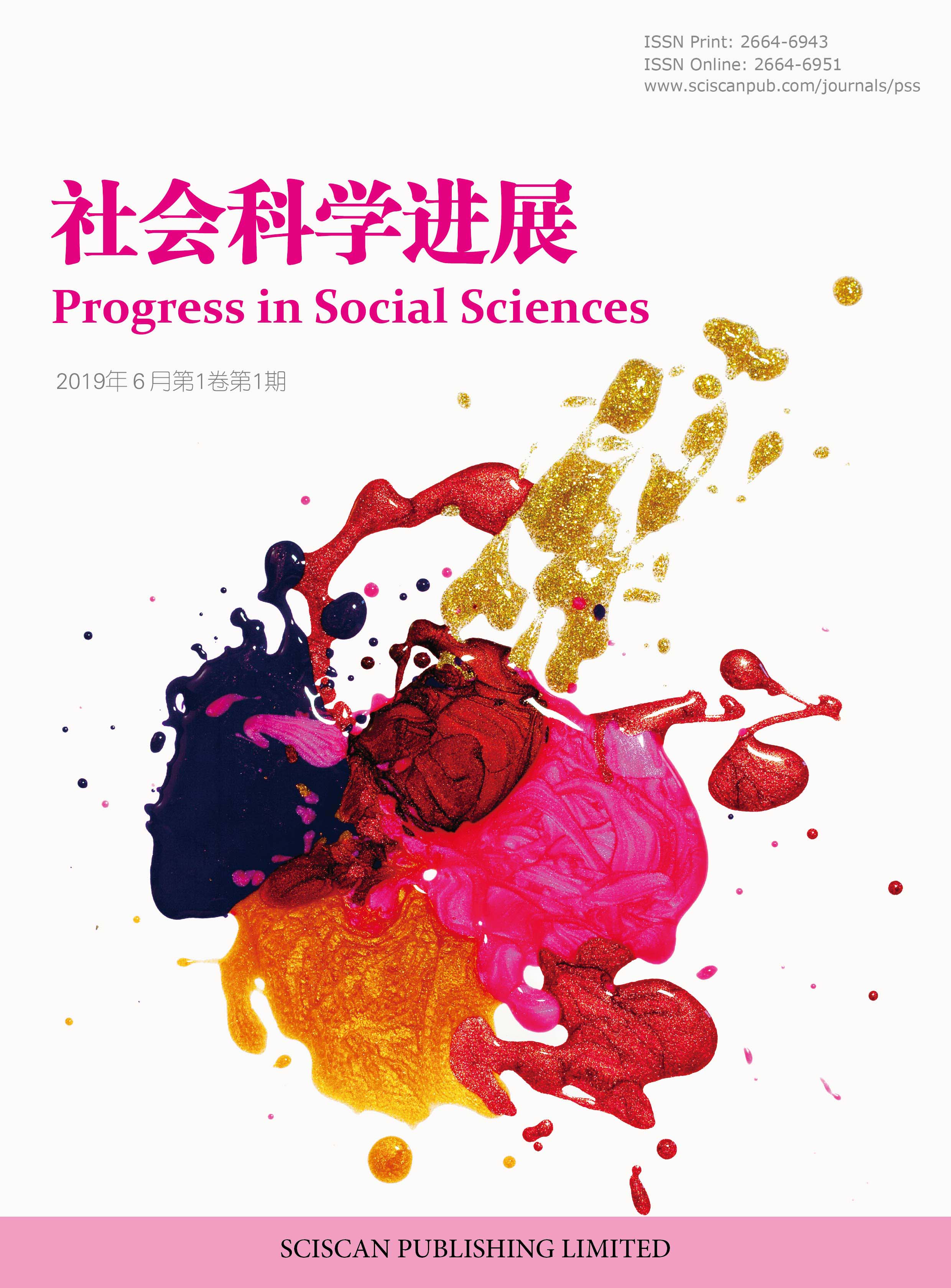Progress in Social Sciences
日本高等教育国际化政策及其对理工科院校外语课程的影响——以东京齿科大学和东京工业大学为例
Japan’s Higher Education Internationalization Policies and Their Impact on Foreign Language Courses in Science and Engineering Universities —A Case Study of Tokyo Medical and Dental University and Tokyo Institute of Technology
- Authors: 马心悦 杨曈
-
Information:
东南大学外国语学院,南京
-
Keywords:
Japanese internationalization policies; Science and engineering universities; Foreign language courses; International talents日本国际化政策; 理工科院校; 外语课程; 国际化人才
- Abstract: This study aims to investigate the impact of Japan’s internationalization policies on the content of foreign language courses in science and engineering universities, using Tokyo Institute of Technology and Tokyo Medical and Dental University as case studies. The analysis focuses on how the reform of foreign language courses contributes to the cultivation of international talents. The findings indicate that Japan’s internationalization policies emphasize enhancing students’ international competitiveness by improving their foreign language proficiency, particularly in English. Tokyo Institute of Technology has improved students’ foreign language application abilities and international communication skills by offering practical, stratified English courses and adding second foreign language courses aligned with international standards. In contrast, Tokyo Medical and Dental University, considering the characteristics of medical education, emphasizes the language skills and international awareness of medical personnel, providing small class instruction and diverse foreign language courses to enhance students’ professional competencies and international communication abilities. Through specific case analysis, this study reveals the implementation and effectiveness of Japan’s internationalization policies in different types of institutions, providing a reference for the reform of foreign language courses in higher education in China. 本研究旨在探讨日本国际化政策对理工科院校外语课程内容的影响,选取东京工业大学与东京医科齿科大学作为案例,分析其外语课程的改革对培养国际化人才的贡献。研究发现,日本国际化政策强调通过提升以英语为主的外语能力来增强学生的国际竞争力。东京工业大学通过设置实用性强、难度分层的英语课程,并增加与国际接轨的第二外语课程,全面提升学生的外语应用能力和国际交流能力。而东京医科齿科大学则结合医学教育的特点,强调医务人员的语言技能和国际意识,通过设置小班授课和多样化的外语课程,提升学生的专业素养和国际沟通能力。本研究通过具体案例分析,揭示了日本国际化政策在不同类型院校中的具体实施情况和成效,为中国高等教育外语课程改革提供了参考。
- DOI: https://doi.org/10.35534/pss.0606154
- Cite: 马心悦,杨曈.日本高等教育国际化政策及其对理工科院校外语课程的影响——以东京齿科大学和东京工业大学为例[J].社会科学进展,2024,6(6):1388-1396.
1 引言
随着经济全球化进程的不断推进,各国对高层次国际化人才的需求日益增加。如何培养和定义国际化人才,以及如何有效实施国际化人才培养,不仅是对各国政府政策制定方面的考验,也深刻影响着大学发展的进程。目前,岸田内阁以“增长和分配的良性循环”为指导思想,积极推动“从根本上加强人力投资”的分配战略,推进科技领域人力资源的培育,大力投资大学经费和先进科学技术,致力打造世界一流研究型大学[1]。从1980年10月提出的“科技立国”战略到五年为一期的《科学技术基本计划》,日本持续更新其政策,显露出对理工科人才培养的重视。与此密切相关的是,日本国际化政策也呈现出向理工类学科倾斜的趋势。例如,根据文部科学省2020年的调查,开设联合学位课程的24项新专业中,涵盖医学、理学、工学及农学等自然科学门类的专业达20项,占比高达83%[2]。在高等教育国际化相关的研究中,大学外语课程作为外语人才培养的重要组成部分,与大学国际化密切相关,值得深入研究与探讨。而理工科外语课程建设在受到日本国际化政策影响的同时,与日本所需要的高层次科学技术研究型人才培养有着不可忽视的联系。作为日本教育政策两大重心的交汇点,我们有必要深入研究日本国际化政策框架下理工科大学推进复合型外语人才培养的新举措。
日本高等教育国际化的早期政策更加偏向于促进提升学生流动性,而非强调课程的国际化[3]。在这一导向的影响下,早期的研究主要集中在增加留学生的接收与输出活动上。受到“海外留学是培养国际化人才的关键”[4]观念的影响,如何提升各国学生的流动性依旧是研究的主要关注点。然而,随着高等教育国际化程度的深化,与课程国际化相关的研究也在逐渐增加。部分研究聚焦于全英文课程学士学位项目上[5],部分研究主要分析了国际化背景下外语类课程的教学目标与内容[6],还有研究将语言教育内容中的外语课程视为一个整体,探讨了其教学模式与评判标准改革和发展方向[7]。与学位项目和教学内容等概念化方针有关的研究主要依托学校自身的资源与专业特色,研究对象多为综合类大学,而在教学模式等实践层面进行的研究,其研究对象多是相对前沿的外语类大学的外语课程,这些研究在探讨理工科院校外语课程内容及其与日本国际化政策的关系时存在空白。因此,本文以东京工业大学与东京医科齿科大学为研究案例,探究日本国际化政策对理工科院校外语课程内容的影响,并尝试在大学改革层面为中国的大学改革提供一定的启示。
2 日本的国际化政策的实施背景和内容
日本国际化政策的实施有着丰富的历史传统和颇具现实意义的背景。日本历史上通过与海外的交流与接触,克服了许多时代的危机。但在实现了经济富裕的20世纪80年代之后,日本渐失领先意识。技术的先进性与国内的巨头产业可能导致日本在全球竞争中面临“加拉帕戈斯化a”的风险[8]。为了让日本社会符合全球化时代的需求,国际化人才培养成了日本国家战略中的重要任务。然而,随着少子化社会的到来,日本国内市场的扩展日益困难。21世纪以来,已有许多行业开始将目光投向海外。全球化的经营战略需要具有国际视野的人才,无论是出于社会需求还是个人发展的考量,国际化政策的制定与完善都显得尤为迫切。
根据“全球化人才培养推进会议”发布的数据显示,2004年至2010年期间,前往海外留学的日本学生呈现明显的下降趋势。在一项对东北大学学生的留学及课程国际化意识调查中,学生出现了“没有出国经历,有意愿但并不了解具体操作方法,缺乏积极的留学准备”的被动态度[9]。年轻学生的志向“内向化”趋势与日本国内的庞大需求形成对比,更要求日本政府采取相应政策来推动国际化人才的培养。
2007年6月1日,在时任首相的指导下,日本内阁正式审议通过了《创新25战略》。该战略强调“强化大学研究和教育两方面的国际竞争力”“推动国际间大学合作联盟的成立”“支持从海外引进优秀人才”[10]等内容,明确了深化大学国际化培养的方向。2011年5月,经由产业界、学术界和政府的合作,文部科学省产学合作促进全球化人才培育圆桌会议发表了《产学官合作的全球化人才培养战略》。同年6月,《国际化人才培养战略》发布,两项战略都极大地丰富了国际化人才政策的内涵。
《产学官合作的全球化人才培养战略》提倡“高校—企业—政府”三方联动,共同推进满足产业和政府需求的更高层次的科学技术研究型人才的培养。根据该战略,大学需提供国际通用且具吸引力的教育方法同时进行内部的国际化改革。具体包括灵活的九月入学时间安排,完善留学相关奖学金和支持制度,以及推进外语课程和外语授课。在留学方面,该战略特别强调宿舍改善、增强日语教育计划、扩展学生间交流机会等发展任务,体现了日本国际化政策对留学生的重视。《国际化人才培养战略》进一步扩展和详细化了培养日本国内国际化人才的具体措施。该战略将国际化人才的培养分为小学、初中、高中阶段、大学阶段与招聘阶段三个部分。在大学阶段,特别强调入学测试为改革的核心之一,推进以托福为基本标准的全面评价方式。为了激励学生,海外经验与托福成绩被纳入学分认定范围,国际化研究经历也能够被视为个人成果进行量化评估。此外,特色课程(如英语授课和留学义务化)以及小班教育和外国教员的聘请也构成了该战略的重要组成部分。
在这两项战略之后,多场会议和政策进一步深化了日本的国际化人才政策。其中最显著的就是基于“留学生30万人计划”而提出的“超级国际化大学计划”。该计划专注支持日本的37所大学,通过国内外交流与内部改革,促进这些大学提升国际竞争力。这一计划是对先前战略内容的进一步细化。在教育改革方面,首先通过适当的编号分配和班级科目分类,确定学习的阶段和顺序,并确立课程的系统性。推广使用托福等外部考试成绩作为本科入学考试的标准。在国际化方面,则有更为细致的指标,推动外语能力达标率上升和教学大纲的英语化。这些措施为教师、学生、课程等多方面的国际化实现提供了支持。
作为日本教育总体方针的《教育振兴基本计划》,也涉及了国际化政策的内容。2013至2017年的第二期教育振兴基本计划主要提出了两项计划:一是增加设定毕业英语能力标准的大学数量与满足该标准的学生人数。二是计划将日本海外留学人数增加至外国留学生人数的两倍。这些计划旨在进一步提高学生的英语能力水平。2018至2022年的第三期《教育振兴基本计划》则强调三个方面:加强以英语为首的外国语教育、开设更多非英语语种的外语课程,以及支持日本学生参与海外留学。这一期计划首次明确强调加强外国语教育的多元化目标,反映了日本外语教育的发展方向。
从一系列具体指标来看,日本的国际化政策对日本各大学,尤其是参与超级国际化大学计划的37所高校的外语课程设置很可能产生深远的影响。首先,在课程目标方面,培养学生的出国能力和提升就业竞争力将成为外语教学的主要任务。《国际化人才培养战略》中将国际化研究经历量化为学生个人成绩的政策建议,将推动学校更加注重外交领域的教育建设。在与产业合作办学的影响下,结合科技与外语的教学,以及旨在增强学生跨文化体验的外语演讲型课程,可能逐步成为外语课程发展的重点。其次,在课程结构方面,日本第三期教育振兴计划提出了“开设更多非英语语种的外语课程”,有望改善长期以来偏向英语的单一性问题,推动小语种课程的发展。具体到课程设计,明确课程的系统性将意味着更细化、更实用、并具有清晰规划和阶段性的外语课程。超级国际化大学计划中的“分类编号”提议,将促进外语课程的分类细化,推动阶段化外语学习的实施。最后,课程内容将更与国际接轨。根据《国际化人才培养战略》和《超级国际化大学计划》的要求,托福成绩对于学生与教师都将成为重要的半硬性指标。增加外教和留学生的比例,以及教学大纲的英语化,将促进全英文授课和外国教员课程的增加。本文将通过东京工业大学与东京医科齿科大学的案例研究,验证上述三方面的推测。
3 东京工业大学——以应用性和国际化为导向的外语课程改革
作为日本超级国际化大学计划A类高校之一,日本最顶尖的理工科综合大学——东京工业大学(以下简称“东工大”)为实现 “世界最高峰的理工科综合大学”这一长期目标,已连续六年将国际化为导向的课程改革纳入年度计划[11]。东工大在多年的改革与日本国际化政策推动下所积累的外语课程模式经验,对我们有着很大的参考价值与研究意义。本文将从课程结构与内容两方面深入分析东京工业大学现有的外语课程体系,并进一步探讨日本国际化政策对理工科院校外语课程内容的影响。
东工大的教育目标在于传授必要素养与技能、专业知识和价值观念,培育具有善意、公平正义和全球视野,并能在科技领域中发挥作用的优秀人才。其使命是为社会发展作出贡献。东工大的教育模式具有两个显著特征:“四年一贯制教育”与“楔形教育”。 “四年一贯制教育”旨在强化学士课程和硕博课程之间的衔接。学校在实施本科与研究生课程融合的专业教育计划中,以通俗易懂的方式展示高年级教学内容,并允许有动力和能力的学生进行“学士修习硕士课程、硕士修习博士课程”的跨学位学习。“楔形教育”是一种将通识教育与专业教育有机结合的教育模式。在东工大,大一新生主要学习理工系、人文社科和语言类的通识教育课程,以培养理工类大学学生应该具备的基本素养。同时,让他们在入学后即可接触到尖端的专业领域,大一新生还需交叉学习专业课程。随着年级的升高,专业课程数量将持续增加,但即使在高年级,学生仍需选修人文和社会科学的课程。其中,外语类课程作为通识教育课程体系的重要组成部分,同样具有楔形教育的特征,从本科一年级贯穿至硕士一年级。虽然外语课程在低年级至高年级的比例逐渐降低,但其始终为必修课,这也侧面说明了东工大对外语教学的重视。

图 1 东京工业大学通识教育课程规划表[1]
Figure 1 Curriculum plan for general education at tokyo institute of technology
3.1 以实用化与国际交流为导向的外语课程目标
在东工大的众多外语课程中,英语课程因其丰富的教学资源和学校的高度重视而成为最早进行课程改革并取得显著成果的课程之一。本文将以英语课程作为切入点,分析东工大制定外语课程目标的出发点。
东工大的英语课程旨在培养学生具备高度的英语应用能力,使他们能够自由表达和倾听。该课程通过听、说、读、写四项技能的培训来实现这一目标。此外,学校通过使用与科学技术基础知识、外交事务和跨文化理解相关的材料,增强学生的精准阅读和听力理解能力,同时培养其国际意识,提升专业知识,为将来步入企业提供经验。基础英语课程包括 “托福托业备考研讨会”“英语口语练习”“英语海外培训”等实用性课程,高年级课程则包括“学术写作”“学术演讲”“海外科技英语实训项目”等进阶内容。
其中最为特别的是“海外科技英语实训”课程,这是东工大海外派遣学生计划的一部分。该课程将学习分为派遣前和回国后两部分,以进一步提高学生的英语学习效果,并提供实践性的学分认证,避免学生因学分互换而困扰。这表明东工大在制定该课程时全面考虑了如何鼓励学生积极参与国际交流。从多样的课程设置中可以看出,东工大旨在实现让学生将英语“学以致用”的教学目标。无论是出国深造还是求职就业,学生都能在东工大找到适合自己方向且实用的课程。
东工大英语课程的最大特点与教学目标体现在课程大纲的关键词中:“英语的四项技巧”“培养国际意识”“交流”“留学”“托福”。这是所有基础英语课程共用的五个关键词。结合东工大的特色课程设置,可以看出东工大的外语教学有两个主要目标:第一,提升学生在托福考试中的竞争力,鼓励学生参加托福考试;第二,以托福为基础,促进学生的国际流动性,鼓励学生进行交换和留学。实际上,后者也是东工大的主要教育特色之一。东工大在官网上特别指出:“强烈建议学生在完成硕士课程之前尝试出国留学或培养自己的国际经验。我们正在增加能够提供出国留学机会的合作大学的数量,增加相关课程与必修语言讲座的数量,增加与国际学生一起学习的机会,并加强我们的留学支持服务。”[12]
3.2 细分难度选择多样化的外语课程结构
东工大为本科一至四年级和硕士一年级的学生提供英语课程,为大学二年级至四年级和硕士一年级的学生提供第二外国语课程。课程按学年分成不同的系列:本科一年级课程属于课程编号100系列,二年级为编号200系列,三至四年级为编号300系列。课程的内容和难度根据课程代码逐步递进。最显著的是“英语第一”至“英语第九”系列课程的递进关系。
在东工大的英语课程表中,贯穿整个学士阶段的“英语第一”至“英语第八”系列课程占据了最大比例。这些课程构成了东工大英语课程体系的基石,按照年级与难度进行划分:大一学生修习“英语第一”至“英语第四”课程,大二学生修习“英语第五”至“英语第八”课程。这样的安排为学生提供了广泛的选择,使英语学习的难度曲线更平滑。从“英语第三”课程开始,课程将分为侧重于阅读与写作和侧重于听力与会话两类。这种细化与个性化的课程安排有助于让学生根据自身水平查漏补缺,提高外语能力标准达标率。
在第二外语方面,东工大提供德语、法语、俄语、汉语、韩语、意大利语和西班牙语,以及古典希腊语和拉丁语课程。东工大拥有丰富的德语、法语、俄语、汉语和西班牙语教师资源,使学校能够为学生提供不同难度的课程,包括初级、中级和高级。而韩语和意大利语课程较少,主要集中在大三和大四。在普通的课程之外,资源丰富的第二外语还设置了研讨会。研讨会分为大三的“研讨会(基础与入门)”和大四的“研讨会(应用与留学)”,后者常采用自由对话的训练形式。由此可见,东工大不仅重视英语,也重视第二外语的高水平运用能力。
3.3 与国际化标准全面接轨的外语课程内容
无论是在基础课程还是在诸多特色课程中,外教在东京工业大学的授课教师队伍中占有重要地位。即使在较为基础的 “英语第一”系列课程中,外教教授的课程数也达到了课程总数的四分之一。[13]外语特色课程如“托福托业备考研讨会”和“学术演讲”更是大部分由外教教授。在具体课程内容方面, “英语的四项技巧”“培养国际意识”“交流”“留学”“托福”这五大关键词贯穿始终,体现出课程与国际化的密切关联。
在大三、大四年级,学生将修读名为“英语第九”的课程。该课程分为“英语第九(仅限申请)”和“英语第九(重修)”两种类型。通常情况下,学生在大三及之后通过托福IBT考试、托福ITP考试或托业考试中获得及格或以上的分数即可获得英语第九课程的学分。未能取得及格分数的学生则可以通过重修课程获得学分。托福成绩几乎成为学生取得学分的必要条件,显示了东工大培养国际化人才的坚定决心。此外 ,东工大鼓励学生到非英语国家进行交流活动。尽管大一学生暂时无法学习第二外语课程,学校仍为他们安排了第二语言海外研修项目,旨在通过国外大学的外语培训项目,加强学生的外语技能与跨文化沟通能力。
作为一所理工类大学,东工大还提供了古典希腊语和拉丁语两门通常仅见于外语类高校的古语言课程。课程内容主要包括语法,并附有部分古典文化通识内容。古语言课程的设立有助于学生了解科学名称的拉丁文命名,加深对现代西方语言和古典文学的理解,兼具人文学科与自然科学的意义。由此可见,东工大的通识教育达到了较为完善的程度,在语言教学方面也兼顾了深度与广度。
4 东京医科齿科大学——以专业需求为核心的外语课程改革
东京医科齿科大学(以下简称“东京医齿大”)与东京工业大学一同入选日本超级国际化大学计划A类高校。虽然同属理工类大学,但两者在学校类型上存在显著差异。与理工门类齐全的东京工业大学相比,以医学类综合大学身份自居的东京医齿大在教学方向上更加专业化,课程设置也相对更为狭窄。因此,东京医齿大的外语课程教学改革规模较小,内容上也相较东工大更少。然而,这也恰恰体现了东医齿大在实施专业化教学过程中,从专业内部出发进行定制化外语课程改革的独特参考价值。
东京医齿大的学院设置与通识教育形式较为特殊。所有学生在入学后,首先在教养部进行为期一年的统一通识教育课程学习,第二学年开始再进入专业教育。这一通识教育模式是东医齿大区别于其他高校的显著特点。
4.1 以提升医务人员基本素养为导向的外语教育目标
根据东京医齿大教养部的官方介绍,截至目前,全日本设置教养部的国立大学仅有东京医齿大一所。教养部的设立回归了大学教育的原点,即“大学是作为构成市民社会的一员掌握教养的场所”,希望学生能够在不分学科的共同学习中接触到多种思考方式,更好地掌握医疗人员所需的教养。
东京医齿大认为,医学教育不仅仅是教授医学知识和技能,更重要的是以广博的教育情怀和丰富的情感培养人性,培养医务人员应有的道德感和同情心。这一具有博雅教育特征的通识教育培养模式,是东京医齿大在多年专业特化培养经验下总结而出的。医科与齿科都是具有“公共”使命和责任的职业,学习医学或牙医学的人,需要有远大的志向和广泛的教养及基础的语言能力。[14]仅按照日本惯有的六年制专门教育模式进行培养,难以满足这一要求。东京医齿大希望学生在锻炼专业能力的同时,加深对社会和人类的认识,以成为拥有广泛知识的专业人才为目标。由此,学校选择通过这种方式统一加强学生的基础教养能力。
在第一学年的教养部学习中,外国语作为通识教育的重要组成部分,是所有学生的必修课程。基于东京医科齿科大学的办学理念和教养部的教育目标,教养部主要根据以下两个方针制定课程:一是“课程以小班授课的形式提供,培养学生作为国际医疗专业人员所需的语言技能”,二是“提供英语授课课程,增强英语思维能力”。英语课程根据学生的能力分班,旨在进一步提升学生的语言技能。在第二外语方面,教养部开设了德语、法语、汉语、西班牙语课程。
在为期一年的学习结束后,教养部继续为各专业提供通识研讨课程。第二学年与第三学年的研讨课程为必修,第四学年则为选修。研讨课程的内容会根据学年变化。以2024年第二学年第一学期开设的通识研讨课程Ⅰ为例,其主题为ELSI(Ethical,Legal and Social Issues),旨在讨论新科学技术对伦理观、法律制度以及社会的影响。根据教学大纲,该课程不仅希望培养学生对情感与人性的感知力,还旨在提高学生提出问题和解决问题的创造力,进而培养具有国际竞争力的优秀人才。第一学年结束后,学生们将根据各自的院系分流,接受高度专业化的教育所有课程(通识研讨课除外)由各学院全权负责。然而,即使在高度专业化的教育体系下,外语依旧是各个院系教学中不可或缺的部分。
4.2 分类分层分难度的外语课程结构
第一学年的教养部外语课程是学年课程的重要组成部分。其种类多样而繁复,但在系统化的安排下展现出井然有序的特点。总体而言,第一学年的外语课程具有分层分类和难度递进的结构特征。
第一学年第一学期的英语课程采用跨学科的授课方式,不同学科的学生根据分班结果集中接受英语教学。教养部将听说和读写分开,学生需在一学期内分别修习“听说”课程与“读写”课程,课表上二者以“英语IA”与“英语IB”为代称。班级根据熟练程度划分,中级为GE(General English),高级为EAP(English for Academic Purposes)。两个不同等级的班级分别设计了不同的教学内容:在听说课程中,GE班侧重于讨论技巧的提高,EAP班则通过讲座和辩论提高学术阅读和笔记技能。在读写课程中,GE班主要提升阅读能力和文章写作技巧,而EAP班更注重学术段落和随笔的撰写。
第一学年第二学期的英语课程采用选修制度,涵盖多样化内容, 包括学科阅读、文学研究和英语讨论能力的提升课程等,统一命名为“英语IC”。在学分与成绩统计方面,学生需将“英语IA”“英语IB”“英语IC”的成绩加总,计入最终的英语科目成绩。因此,第一学期的两门课程和第二学期的一门课程均为必修,不可忽视。
第二外语的选修规则较为特殊。学生可以通过两种方式选择第二外语课程:一是根据入学时提交的志愿分组进行选课,二是在入学后进行选课申请。留学生需必修日语。第二外语的学习从基本语法和发音开始,旨在培养学生基本的写作、阅读、听力和口语能力,并涉及文化问题的思考,目标促进学生对多样文化的理解。其中,结合医学专业知识的“中文II”课程尤为特殊。该课程将医疗现场的常用表达分为13个话题,旨在培养学生掌握中文的实际表达能力和应用能力,以便与合作医院的中文患者进行基本沟通。这一课程具有极高的实用性和教育意义,响应了全球化背景下医疗人员中文教育需求的增加。
4.3 医疗知识与语言相结合的外语课程内容
进入第二学年后,各专业学生的课程安排由其所属院系负责,课程内容主要转为专业所需的知识与能力培养。然而,这并不意味着外语课程的缺席。相反,各院系根据自身专业的特点和资源,开设具有专业特色的英语课程,同时将英语、中文等外语融入专业课教学之中。
以东京医齿大医学系为例。在医学系的第一门课程“医学导论”中,教学目标就包括掌握非专业性英语表达、英语单词的书写与发音。此外,“医学导论”课程中约五分之一的授课内容以全英文进行,主题为“世界的医疗”。不仅如此,生理学和神经生理导入等课程也将部分英文授课纳入课程大纲。而具有地方文化特色的“东洋医学”课程,甚至正在考虑使用中文进行考试出题。
同时,各专业也开设了许多具有专业特色的外语课程。以保健卫生系的检验技术学为例,根据该课程的制定方针,为了应对国际化和信息化,学生需持续学习四年英语和信息素养科目。这一点在课程表中有所体现。检验技术学提供“卫生保健学英语”和“医学英语”两门英语课程。前者为普通英语课程,由专业自主开设,后者则更具特色。“医学英语”课程的前半部分侧重让学生学习与采血、检体、生理机能检查等相关的英语以及与患者交流所需的英语,后半部分则教授国际杂志的阅读方法和在国际学会上做报告的方法。
此外,海外短期留学也成了课程设置的一部分。检验技术学的选修课程中包括四门“短期海外研修”课程。海外研修派遣制度会根据成绩、语言能力和面试评价来进行选拔,这要求学生具备足够的语言能力以确保研修时不会遇到语言障碍,并要求学生提前通过托福的语言评价。这些课程不仅鼓励日本学生前往海外留学,也有助于提升学生的英语水平,使他们掌握与国际接轨的英语能力。
5 日本高等教育国际化政策对两所高校的影响分析
日本高等教育的国际化政策对日本两所理工类高校的外语课程改革起到了重要的指导作用。这两所高校在外语课程改革方面,不仅通过政策的指引制定了一些具有共同特征的改革方案,还各自根据本校的实际情况,实施了与实际需求相贴合,具有独特性的具体措施。这些措施不仅为其他日本高校提供了有价值的借鉴,同时也为中国高校在外语课程改革中提供了有益的参考。
5.1 共性举措
根据以上对东京工业大学与东京医科齿科大学两所高校外语课程目标、体系与内容的了解与分析,可以发现日本的国际化政策对这两所高校外语课程的改革产生了显著影响,并在改革整体方向上起到了指导作用。在同一政策方针的影响下,这两所理工类高校在国际化举措上展现出一定的相似性与共通性。
在培养目标方面,两校都明显受到《产学官合作的全球化人才培养战略》的影响,在教学目标中提倡培养更高层次的具有国际化能力的实用型人才。两所大学的外语课程改革都注重提升学生的国际竞争力与交流能力。根据该战略,大学需要提供具有国际通用性的教育方法。东京工业大学通过“楔形教育”模式,在本科一年级到硕士一年级的课程体系中贯穿外语教学,尤其注重英语的听说读写四项技能训练,以及实际应用能力的提升。课程目标不仅包括提高托福成绩,还强调培养学生的国际意识和跨文化交流能力,鼓励学生参与国际交流和留学活动。类似地,东京医科齿科大学的外语课程目标同样强调提升学生的英语应用能力,但更侧重于医学领域的专业应用。课程设置旨在培养学生在国际医学交流中的沟通能力,使其能够参与国际医疗合作和研究活动。课程还注重提高学生的职业道德和人文素养,以培养具有国际视野的医务人员。
在课程结构方面,为满足第二期教育振兴基本计划中“满足毕业英语能力标准的学生数目增加”的要求与“超级国际化大学计划”中教育改革“明确课程系统性”的要求,东京工业大学和东京医科齿科大学都采取了分层分难度的教学措施。这两所学校均在英语教学模块方面实施了平滑的难度分层,将“听说”与“读写”分开进行精细化教学分块,将系统性与灵活性结合,为学生提供了多元化的选择。这一举措有助于提升学生学习动力,便于学生进行个性化学习,提高学习效率,从而真正提升学生外语能力达标率。此外,为响应第三期教育振兴计划中“开设英语以外的更多语种的外语课程”的要求,丰富第二外语课程的深度与广度也成为外语课程种类拓宽与分层的重要部分。两所学校均设置了丰富的第二外语课程。其中,东京工业大学的第二外语课程具有不同难度层次划分,并为大一学生提供第二语言海外研修项目。而东京医科齿科大学的第二外语选择则更加强调学生的自主性,同时具备一定的专业特色。
在课程内容方面,受到第二期教育振兴计划中“日本海外留学人数较外国留学生人数翻倍”目标的影响,以及第三期教育振兴计划“支持日本学生进行海外留学”要求的推动,东京工业大学和东京医科齿科大学在课程中都添加了海外研修项目,注重与国际标准接轨,鼓励学生前往海外留学。此外,受到《产学官合作的全球化人才培养战略》的影响,两校都在外语课程中融入了与语言知识相关乃至与专业知识互补或结合的实用知识。东京工业大学设置的拉丁语与希腊语课程不仅有助于学生在自然科学领域取得更加全面的知识储备,也有利于提高学生的人文科学素养。而东京医科齿科大学则更偏向于将外语教育与医学专业教育相结合,不仅有助于提升学生的外语水平,也有利于加深学生对医学专业知识的理解和掌握。
两所高校在目标、结构、内容三方面的共性举措在新时代外语人才培养方面具有显著优势。提升学生的国际竞争力与交流能力的目标不仅有利于培养学生的素养,也为学生未来与国际教育体系接轨提供了坚实基础。系统性与灵活性相结合的分层分难度模块化教学促进学生对外语知识的吸收。深化第二外语教育使学生能够了解不同国家的文化,甚至有机会前往当地学习生活。鼓励学生前往海外留学是推动外语人才国际化的重要环节。将专业内容与外语教学相融合,有助于培养当今社会需要的国际化实用型人才,能够助力学生未来的就业与升学活动。
5.2 特性举措
由于两所高校的基本类型和教学方针等主客观条件的不同,在实施共性举措的同时,也存在着许多不同于彼此的特性举措或改革重点。
东京工业大学更加注重对课程内容方面进行综合性全面性的国际化改革。面对《国际化人才培养战略》中对外国教员聘请和特色课程的要求,东京工业大学聘请外教参与特色课程与基础课程教学,并开设了“海外科技英语实训项目”等课程,正符合《国际化人才培养战略》对外国教员聘请和特色课程的要求。同时,受到《国际化人才培养战略》中“将国际化研究经历量化为学生个人成绩”的政策建议影响,托福作为必修课中的核心内容在东京工业大学英语教学中的地位被大力强化这一做法有效解决了语言类证书所需知识与实际语言课程内容之间的脱节问题。“英语第九”课程更是将托福与托业成绩作为获得学分的必要条件,响应了“推进以托福为基本标准的全面性评价方式”的要求。这一系列举措,是东京工业大学外语课程国际化改革的重点。
东京医科齿科大学同样重视国际化,但其改革更倾向于在专业学习中进行实用性的外语渗透,具有显著的专业化色彩。如果说东京工业大学的外语课程改革更侧重“广度”,那么东京医科齿科大学的外语课程改革则更注重“深度”。这与东京医科齿科大学“医学类综合大学”的自我定位息息相关。根据《产学官合作的全球化人才培养战略》中“高校——企业——政府”三方联动配合的要求,高校需要提升学生产业就业能力 ,实施“科技+外语”相结合的教学。东京医科齿科大学通过博雅教育的形式培养学生的通识素养,包括外语能力,并注重外语在专业中的实际运用,开设了许多将专业知识与外语知识结合的课程,满足了产业合作办学的需求。此外,根据《国际化人才培养战略》中关于托福的建议,东京医科齿科大学的英语课程大纲同样涉及托福备考,海外研修派遣更是直接要求托福成绩。然而,整体而言,其对托福的依赖程度不及东工大“已然将本校外语教育与托福深度挂钩”的态势。
6 对中国高校的启示
从以上对政策影响的分析可以看出,日本的国际化政策在推动两校外语课程改革的同时,两所大学也根据自身特点进一步完善了外语教学体系与内容,将政策中的宏观方向细化落实为可操作、可实践的方案,为其他大学的外语课程改革作出了示范。由此,中国理工类院校也可以从东京工业大学与东京医科齿科大学的实践中汲取经验与启示。
首先,要明确培养国际竞争力和跨文化交流能力的教学目标,并紧密围绕这一目标进行课程改革。成功的国际化课程改革,需要将政策要求具体化,并根据学校的经济能力、生源师资等实际情况制定出切实可行的改革方案。明确教学目标后,需要紧密围绕该目标构建教学体系,而不是让体系与目标分离,沦为“空中楼阁”。在这一点上,东京工业大学的案例值得参考。对东京工业大学的外语课程安排进行研究后,可以发现“英语的四项技巧”“培养国际意识”“交流”“留学”“托福”这五个关键词几乎贯穿了从基础英语课程到跨文化课程等进阶课程的整个过程;所有教学工作都紧密围绕这些关键词展开。这一围绕同一培养目标构筑课程内容的方案,有助于提高教学目标的落实效率,更好地完成国际化政策中的要求。
其次,在外语课程的结构改革方面,分模块分层次教学是两所高校的共性举措。这不仅与“超级国际化大学计划”的明确要求密切相关,同时也反映了课程结构细化在外语课程改革中的重要性。在中国,基于学生水平进行难度分层的外语教学模式已逐步在各类高校中推广。然而,仍有相当一部分高校,尤其是理工类院校,依旧采取单一的“大学英语”授课模式。将“听说读写”分开,进行模块化教学,不仅能提升外语学习效率,还能解决大学英语“样样学样样不精”的困境,更好地提高学生外语能力。
最后,在外语课程的内容方面,两所高校展示了根据国际化政策制定的两套不同的可操作方案。这两套方案并不冲突,可以相互借鉴。东京工业大学围绕托福制定的学分政策和课程内容,是对日本国际化政策《国际化人才培养战略》中“推进以托福为基本标准的全面性评价”要求的具体落实。尽管国情不同,这一改革对中国高校也有一定的参考价值。不同的外语资格考试有着不同的重点与模式,而掌握至少一张国际通行的外语证书已经成为国际化人才的基本条件。大学作为培养国际化人才的温床,围绕雅思、托福等考试进行系统化教学,可以随着学生外语水平的逐步展开。而东京医科齿科大学将专业知识与外语课程融合的教学模式,特别适合各类单科尤其是理工科类大学借鉴。根据不同的专业量身定制专门的外语课程,在综合类大学可能因专业繁杂而显得奢侈、不切实际,但对于专注某一门类的大学,如医学院来说,却是提升学生综合外语能力的良好方式。 这不仅能培养学生的外语能力,还能注重其在专业领域的实际运用,是培养国际化实用性人才的重要方针。
总体而言,两所学校的教学目标虽有所不同,但都成功地将总体教学方针与国家的国际化政策紧密结合,制定了适合本校软硬件条件的外语课程改革方案。面对培养新时代国际化专业型人才的紧迫需求, 我国的理工类高校也应当加快改革步伐,在我国国际化政策的引领下,借鉴并吸收海内外有效经验,结合本校实际情况,积极培养新时代复合型外语人才和高层次国际化人才,全面推进高质量的外语课程改革。
参考文献
[1]科技政策局研究及发展策略科.令和4年版科学技術·イノベーション白書[R].文部科学省,2022.
[2]高等教育局国立大学法人支援課.国立大学の国際化について[R].国立大学法人の戦略的経営実現に向けた検討会議(第5回),2020.
[3]太田浩.大学国際化の動向及び日本の現状と課題:東アジアとの比較から[J].メディア教育研究,2011,8(1):S1-S12.
[4]末松和子.「内なる国際化」でグローバル人材を育てる ―国際共修を通したカリキュラムの国際化―[J].東北大学高度教養教育·学生支援機構紀要,2017(3):41-51.
[5]堀内喜代美.日本の学士課程における英語による学位プログラムの発展と可能性 特集 「高等教育の国際化とグローバル化への対応」[J].国際教育,2016(22):35-54.
[6]草本晶.外国語教育と 「異文化理解」[J].ドイツ語教育,2019(23):75-80.
[7]金子百合子.外国語大学の語学教育が抱える課題と語学教育改革の展望[J].国際語としてのロシア語: 国際統一基準による言語能力レベル評価システム構築の現状と将来的課題,2019(45):35-50.
[8]高等教育局専門教育課.グローバル人材育成推進会議 中間まとめ[R].文部科学省,2011.
[9]神谷哲司,工藤与志文,田中光晴,等.東北大学生の留学及びカリキュラムの国際化に関する意識[J].東北大学大学院教育学研究科教育ネットワークセンター年報,2015(15):1-13.
[10]内閣府.「イノベ-ション25」第5章「イノベーション立国」に向けた政策ロードマップ分割1[R].内閣府,2007.
[11]東京工業大学企画·国際部 企画·評価課総合企画グループ.中期目標·中期計画[EB/OL].(2022-02-28)[2024-04-26].https://www.titech.ac.jp/public-relations/about/overview/mid-term-goals.
[12]国立大学法人 東京工業大学.東工大教育の特徴[EB/OL].[2024-04-26].https://www.titech.ac.jp/public-relations/education/features.
[13]国立大学法人 東京工業大学.OCW教養科目群 英語科目[EB/OL].[2024-04-26]. http://www.ocw.titech.ac.jp/index.php?module=General&action=T0210&GakubuCD=7&KamokuCD=110200&tab=2&focus=100&lang=JA&_gl=1*cw7l2k*_ga*MTk1MzQ5Njc5My4xNzExMzcxNTMz*_ga_VKBJ61GEPE*MTcxNDE2NzM0My4yLjEuMTcxNDE2OTg3Mi4wLjAuMA.
[14]国立大学法人 東京医科歯科大学.2024年度東京医科歯科大学教養部 履修の手引き[R].東京医科歯科大学 教育要項(学部シラバス),2024.
[1] 来源:东京工业大学官网(https://www.titech.ac.jp/public-relations/education/features/liberal-arts-career)由笔者翻译制成。学生策划课程是学生自主设计的尖端通识课程。具体流程与尖端通识课程相同,但主题与策划全部由学生自己负责。
[1] 加拉帕戈斯化是日本的商业术语之一。当产品和服务在孤立的环境(日本市场)中优化时,它们与外部(外国)产品不兼容并且被孤立地甩在身后。当具有更优性能的产品和技术从外部引入后,本地产品将会有被淘汰的风险,正如加拉帕戈斯群岛的生态系统一样。
















